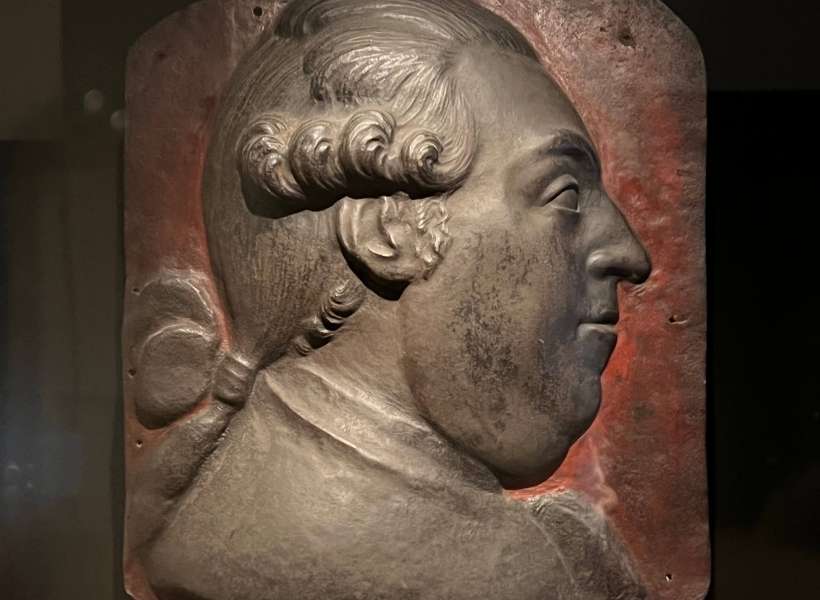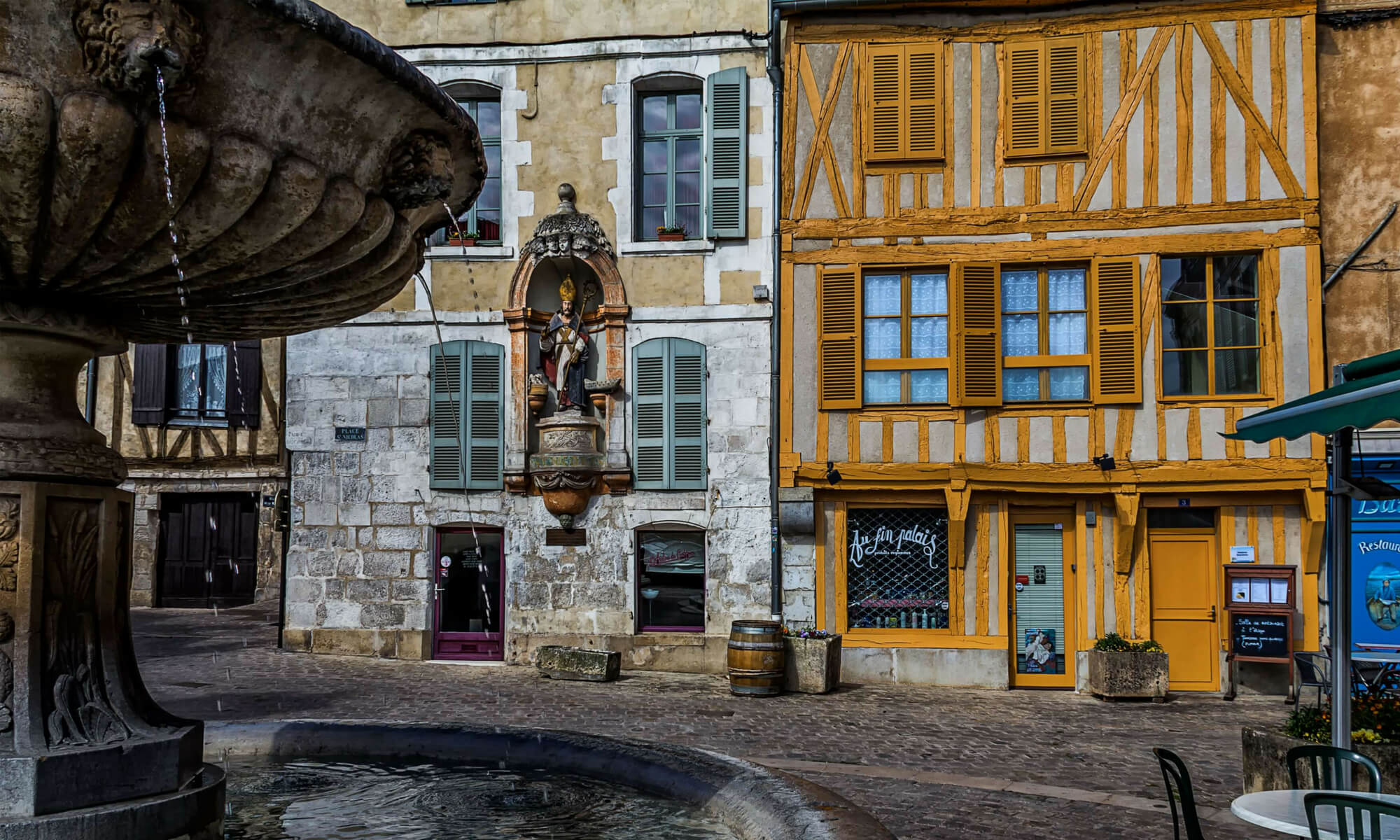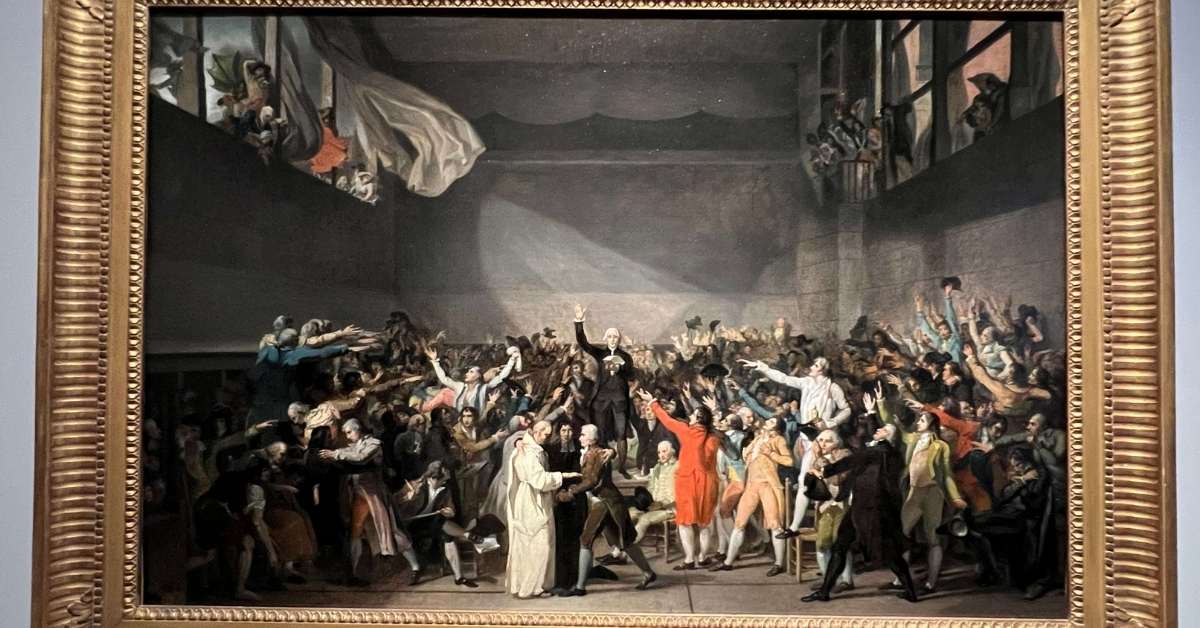Table of Contents for this Episode
Category: French History
In this episode of the podcast, historian Suzanne Levin explains how the French Revolution came about and brings us all the way to the Terror. It’s impossible to understand the Terror without this background information, so start with episode 366 before moving on to episode 367.
Setting the Stage of the French Revolution
What were the conditions that led to the French Revolution?
Bankrupcy
Louis XVI was out of money and ran out of options to solve the bankruptcy problem. Why was he bankrupt? We like to talk about the lavish spending at the court, but that’s not what did it. We seldom remember the Seven Year’s War that France lost. France also sent troops in support of the American war of independence. War expenditures were the big problem even if we can easily point the finger at spending on palaces and lavish parties.
Inability to collect taxes from the French aristocracy
The French aristocracy held most of the money in France and yet they paid no taxes. This was Louis XVI’s biggest problem. The king called the Assembly of Notables in 1787, a couple of years before the Revolution. He asked them directly to make France solvent again by paying some taxes (which aristocrats in England were already doing) because the state was out of money. The aristocracy refused based on ancestral privileges that they didn’t want to give up.
The Estates General
When it became clear that Louis XVI couldn’t collect taxes from his own aristocracy, he decided to play the only other card he had at his disposal: calling the Estates General. This heeded back to the days of late Middle Ages when they decided that different groups in society needed to consent taxes.
Louis XIV had established himself as an absolutist monarch who had no need for the Estates General. His aura was so great over the monarchy that he could persuade the different parts of society to do what he wanted without recourse to the Estates General process. Both Louis XIV and Louis the XV reigned for 150 years without consulting the three estates.
The Three Estates in French society
The first estate is the Catholic clergy, the second estate is the nobility, and the third estate is everyone else. The first two orders are called “the privileged orders” because they don’t have to do things like pay taxes. They also have the right to hunt, the right to raise local taxes, the right to make local judicial decisions. The privileged estates make up at most 5% of the population in France.
Parrish priests are not necessarily counted in the first estate. The Catholic church had princes and diplomats, and some of them weren’t priests at all, such as Cardinal Mazarin who was never ordained. By comparison a Parrish priest could be the son of a Lord (in which case he was first estate) or the son of a merchant (in which case he was third estate).
The two privileged estates need to pay taxes because the bankruptcy crisis cannot be resolved on the back of the third estate alone. Louis XVI thinks the third estate will put pressure on the privileged estates to pay their share in taxes.
The demands of the third estate
But the third estate has its own demands and wanted reforms of various kinds. And let’s not forget that they make up 95% of the population!
- Everybody in the third estate wanted the privileged estates to start paying their fair share of taxes.
- The third estate wanted an end to institutional blockages that kept them from rising above basic ranks both in the military and in the church. For example, members of the third estate who joined the army could never rise over the rank of Captain. Parrish priests could never be selected as the Bishop because they weren’t nobility.
- The peasantry wanted to stop being forced to pay seigniorial dues. Aristocrats sold rights to bits of their land to Lords who could demand whatever they wanted from the people who lived there.
- Justice was terribly arbitrary and peasants wanted to know what was what. They wanted a rule of law and not a rule of lord.
Originally the deal with the feudal system was that the Aristocracy protected the peasantry. But by the time the 1700s rolled around, this hadn’t been the case for hundreds of years.
Aristocrats simply put whoever they liked in charge of large swaths of their lands. Whoever was in charge (who could be of noble birth or be given the privilege for valor) could squeeze the peasantry without providing anything in return.
The local lord usually established a monopoly on things like mills. They were the only ones who could have a mill and they set the prices any way they liked. Or they allowed someone else to have a mill but they demanded a high percentage of the profit.
Cahiers de doléances
Louis XVI wanted to understand the demands of the third estate. He asked them to send in “cahiers de doléance” (notebooks of grievances) filled with what mattered to the people. Often, it was the local priest who filled out the notebook because they could write better than almost anyone else in a village.
Louis XVI wanted to be seen a a benevolent monarch. A paternal figure who listened to his people and he really tried, but he failed to convince most parties that he could be part of the solution.
Vastly different laws throughout France
One major problem was that France was a patchwork of all sorts of different legal systems. Every region (and sometimes every town) had its own local privileges and laws. “Parlements” were not parliaments at all but rather the highest law court in a given area.
The parts of France (in the south) where they had been well integrated into the Roman Empire had written law. In the north laws were even more changing. Then you had the “lettres de cachet” where if a member of your family could write to the king and have you put away who had the lord’s ear (or the king’s ear ) could get you put away without any due process.
In criminal cases you didn’t have access to a lawyer and it was against the rules to have a lawyer at all! Why would you want a lawyer if you have nothing to hide, eh?! Of course peasants should represent themselves in court! It made it easier for the magistrate to get his way.
Necker and the politics of the Ancien Régime
In the Ancien Régime the king was supposed to make all political decisions, but he was surrounded by ministers and advisors who sometimes contradicted him. Necker was the finance minister and he had been sent away before for unpopular opinions. Any up-close challenge to the king’s despotism was not welcome. Necker was popular with the people because he could challenge the king on some of his despotic ideas.
Necker pointed out repeatedly that the kingdom was broke and that the king needed to put his foot down and get his nobility to pay taxes. He was also dead-set against liberalizing the grain trade because one thing the king needed to do was keep the price of bread steady.
Marie-Antoinette never said “let them eat cake”because when the grain market is deregulated and speculators can get rich on the price of grain, then the people can neither afford bread or cake.
From the Estates General to the National Assembly
One of the things the people wanted was a Constitution because without a Constitution there cannot be a free state. They wanted a situation where the people could elect representatives who would write the law. The king would have a very limited role. And even that tiny role seemed like too much to some of the people who wrote the initial Constitution.
Louis XVI in the face of strong opposition
The king had veto power in the first Constitution because a law would only pass if he didn’t veto it three times in a row. He still got a large stipend and a cabinet.That was a lot of concession from the revolutionaries.
But Louis XVI was not prepared to accept a minor role as a constitutional monarch. He was raised with the notion that he was appointed by God to rule over France and make all the decisions. He was OK listening to the people’s representatives, but he thought he should have the last word on everything.
Louis XVI spent a lot of time wondering how to return to the conditions before the Revolution and he should have known that you can’t put a broken egg back together again.
The king wasn’t the only one who didn’t accept the new situation. Aristocrats started to leave France (we call them the Émigrés) as early as 1789. The did not accept even moderate reforms.
To be able to vote according to the original Constitution, you had to be well-off, pay a certain level of taxes, be the head of the family (widows could be the head of the family so women were not excluded per se), so the original proposal from the people was extremely moderate.
Losing privileges
But the king wouldn’t accept that and used his considerable influence to shoot down the new Constitution at every turn. Most people from the privileged orders can’t accept losing their privileges.
By virtue of the new Constitution, the aristocracy lost their privileges. They no longer had exclusive rights to hunt. They couldn’t rule on local cases any way they pleased. On the other hand, seigniorial dues are not abolished in 1789.
Few people accepted the first Constitution
The king and the aristocrats did not accept the original Constitution and neither did the people who wanted it to go further. You also have the aristocrats who emigrated and tried to convince France’s neighbors to declare war on France. You have the folks in southern France who organized the Camps de Jalès in an effort to undermine the new order of things.
Not just a Parisian Revolution
Most of the people of France were peasants and initially they supported the Revolution and participated in it. But their demands kept being ignored by the new rulers put in charge by the people and they rose up time and time again to try to get their voices heard. Peasants wanted to become land-owners and not be at the mercy of local lords. This was not part of the original plan.
La fuite de Varenne
In 1791, two years into the Revolution, the king decides to flee his own country and escape to Austria where he was sure his wife’s brother could help him regain the upper hand in France. He thought he could lead a foreign army in the battle to regain his kingdom.
This turned out to be a terrible decision. The king got stopped at Varenne and was brought back to Paris under heavy guard. At this point people wondered why we should keep him around at all. Who needs this ruler who thinks he can wage war against his own countrymen?
Do we even need a king at all?
After the Flight to to Varenne the king was forced to pledge his loyalty to the Constitution and that bought him a little more time. There were episodes of violence against anyone who wanted to vote on what to do about the king. In 1791 there were still many revolutionaries who were trying to find a role for the king despite all of his actions.
So, in 1791 the king swears allegiance to the Constitution while doing everything he could to undermine it.
The role of the émigrés
In 1791 the émigrés were grouping on France’s borders, for example in Austria, and they get the emperor of Austria and the king of Prussia to sign a pact which says that they are willing to interfere in France’s governance if they continued down the path of the Revolution.
War against Austria
There were plenty of people in France who were in favor or declaring war against Austria. War is good for the economy, they say it’ll be quick and painless, and that’s rarely the case. There were also plenty of revolutionaries (like Marat) who also happened to have more democratic leanings and who didn’t think the country was ready for war.
The other party that is pushing for war against Austria is the king and the nobility because they hope that the young government of the Revolution would lose and surrender power to the king.
The Role of Lafayette
People like Marat started saying in 1791 that a war against Austria was a terrible idea and might result in a military dictatorship. One of the people they were mostly worried about was Lafayette because he had plenty of experience, had his own army and was popular. He actually tried to take power at one point.
Defaulting on the debt
It never occurred to anyone at the time that one solution to all of this would be for the king to default on his debt. They were in the mindset that every penny owed had to be paid back. Given that, it’s not clear that even if the aristocracy had agreed to start paying some taxes they would have been able to repay the debt. Because they also wanted to start new programs at the same time, and no amount of taxation would have been enough.
The religious factor
What they decided instead of defaulting on the debt was to nationalize or take over church property. This had already happened during the Reformation. The idea was not necessarily to kill the Catholic church, but to say the Church is supposed to help the people, so that’s who’s going to pay. The wealth of the church should belong to the people of France and not to the Pope.
The church owned as much as half of the land in certain regions of France. Often seigniorial dues were paid to the Abbey because that’s who owned the land, so the church was flush with both land and cash.
They decided it would be better to take over church property (and the dues that came with it) and pay a salary to the clergy. They also decided to grant freedom of religion to everyone, but only Catholic clergy would receive a salary since it was Catholic property that was funding this whole thing. So you have freedom of religion, but not separation of church and state.
Swearing an oath to the Constitution and the Pope’s involvement
It had become habitual to ask people to swear an oath to the new Constitution, the new rules, the new system. The oath talked about the Nation, the Law and the King. In order for clergy to receive their salary, they asked them to swear this oath.
And then the Pope condemned the whole thing. He said that this was heresy, the Rights of Man is heresy, and anybody who goes along with it is a heretic. Regular Parrish priests (who were not wealthy by any means) were supposed to forgo a salary so they wouldn’t be heretics. The Pope put them in an untenable situation.
Overall about half the priests swore the oath, but it varied greatly by region. Some places almost all the priests decided to swear the oath and other regions almost none of them did. In the regions where they don’t they also told parishioners that if they supported the Revolution they’d go to hell. This created a major split.
In areas where priests refused to swear the oath a replacement priest was sent who was paid by the state because the other guy had refused the contract. This upset people because they didn’t want the state telling them which was the right priest.
Louis XVI declares war on Austria and other neighbors
A completely unprepared France started a war against Austria and started to lose very badly. It did not help that many of the people who were leading the army were against this war. The king was against this war. A lot of leaders wanted to lose because they wanted the monarchy back.
When they realized that the king was sabotaging the war more people decided that they needed to get rid of the monarchy all together.
Petitioning the Assembly to get rid of the Monarchy
Once enough people decided that the king was never going to go along and that he needed to go, they petitioned the Assembly to do something but the Assembly didn’t want to make the hard decisions.
A few Parisians and some people from the Provinces took matters into their own hands and maneuvered to elect a new Assembly (which would be called The Convention) to write a new Constitution for France. This new Assembly splits up in the left wing The Montagnard and right wing, the Brissotins (later called Girondins). They argue about what to do about the king, should we just decide within the Assembly or should we listen to popular political opinion.
Drafting recruits into the army
The army was not getting enough recruits so they drafted a certain number of young men from every region. At this point the people of France are not happy because what they wanted most (i.e. abolishing seigniorial dues) didn’t happen, now they are drafting young men into the army, they drove away priest that were well liked, and they’re not sure where they’ll find workers for the harvests.
The displeasure of the people manifested itself in different uprisings all over France, the worst of it in the Vendée because that conflict was terribly mishandled. In the Vendée the discontent turned into a full-on civil war.
France was in bad shape
Right before the Terror started France was in terrible shape. At war against several neighbors, pockets of civil war here and there, generals who did not obey orders, corruption, etc. They were in no position to hold elections or to put in place any of the reforms they were dreaming of.
In early 1793 Spain, the Netherlands and England joined the coalition against France. They were hoping to tamp down any revolutionary contagion. England wanted to take their biggest rival down a peg because they were still upset about the American war of interdependence.
The Terror
The Terror started just as France was trying to find itself in the middle of a foreign and civil war. There were excesses and atrocities committed, but we’ll get into that in the next episode of the podcast.

Subscribe to the Podcast
Apple YouTube Spotify RSSSupport the Show
Tip Your Guides Extras Patreon Audio ToursRead more about this show-notes
Episode PageCategory: French History



